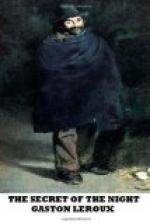The others said: “Ah, ah, the good Gounsovski. He knows. He knows. Certainly, accept his supper. With Annouchka it will be fun.”
“Messieurs,” asked Rouletabille, who continued to make discoveries in the audience, “do you know that officer who is seated at the end of a row down there in the orchestra seats? See, he is getting up.”
“He? Why, that is Prince Galitch, who was one of the richest lords of the North Country. Now he is practically ruined.”
“Thanks, gentlemen; certainly it is he. I know him,” said Rouletabille, seating himself and mastering his emotion.
“They say he is a great admirer of Annouchka,” hazarded Thaddeus. Then he walked away from the box.
“The prince has been ruined by women,” said Athanase Georgevitch, who pretended to know the entire chronicle of gallantries in the empire.
“He also has been on good terms with Gounsovski,” continued Thaddeus.
“He passes at court, though, for an unreliable. He once made a long visit to Tolstoi.”
“Bah! Gounsovski must have rendered some signal service to that imprudent prince,” concluded Athanase. “But for yourself, Thaddeus, you haven’t said what you did with Gounsovski at Bakou.”
(Rouletabille did not lose a word of what was being
said around him, although he never lost sight of the
profile hidden in the black mantle nor of Prince Galitch,
his personal enemy,* who reappeared, it seemed to
him, at a very critical moment.) ___________________________
_________________________________________
* as told in “The Lady In Black.” ____________________________________________________________
________
“I was returning from Balakani in a drojki,” said Thaddeus Tchitchnikoff, “and I was drawing near Bakou after having seen the debris of my oil shafts that had been burned by the Tartars, when I met Gounsovski in the road, who, with two of his friends, found themselves badly off with one of the wheels of their carriage broken. I stopped. He explained to me that he had a Tartar coachman, and that this coachman having seen an Armenian on the road before him, could find nothing better to do than run full tilt into the Armenian’s equipage. He had reached over and taken the reins from him, but a wheel of the carriage was broken.” (Rouletabille quivered, because he caught a glance of communication between Prince Galitch and Natacha, who was leaning over the edge of her box.) “So I offered to take Gounsovski and his friends into my carriage, and we rode all together to Bakou after Gounsovski, who always wishes to do a service, as Athanase Georgevitch says, had warned his Tartar coachman not to finish the Armenian.” (Prince Galitch, at the moment the orchestra commenced the introductory music for Annouchka’s new number, took advantage of all eyes being turned toward the rising curtain to pass near Natacha’s seat. This time he did not look at Natacha, but Rouletabille was sure that his lips had moved as he went by her.)




